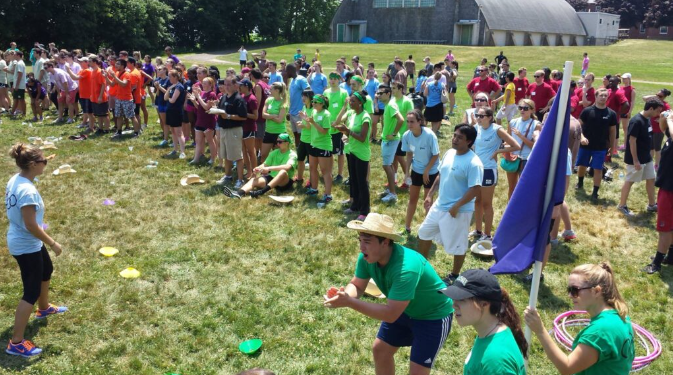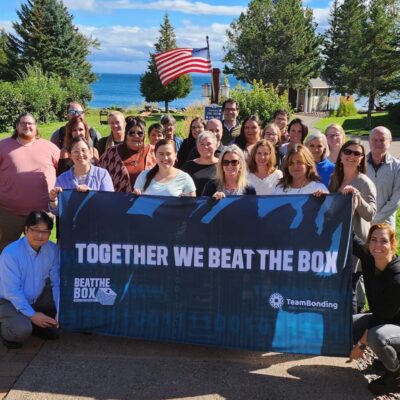Peer recognition is an oft overlooked but crucial aspect of a healthy and successful work environment. Peer recognition can help you build a stronger, more motivated, and more connected team. According to a recent Gallup report, employees who are properly recognized are five times more likely to stay, four times more likely to be engaged at work, and five times more likely to feel connected to their workplace.
What is peer recognition? In simple terms, peer recognition is acknowledging and recognizing the skills, work, and contributions of others. However, it goes a lot deeper than that.
In our most recent episode of the Team Building Saves the world podcast, we talked about the importance of peer recognition with people first advocate and engagement expert, Christie Hoffman. During our conversation, she mentioned how peer recognition is more than just saying thank you.
“Recognition is not just saying thank you. Recognition is recognizing the talents, skills, strengths, outputs, or contributions of someone,” she noted. “So peer recognition is recognizing all of that with someone you work with.”
In this article, we’re going to cover the benefits of peer recognition, create the right culture for recognition, how to ensure your employees are being recognized, and how to sustain that momentum into the future.
The Benefits of Peer Recognition
First, let’s go over the benefits of peer recognition. This will help you understand the peer recognition meaning and why it’s such an important part of building a great team, psychologically safe workplace, and a healthy company culture.
Improved Morale and Motivation
One big benefit of peer recognition is improved morale and motivation. It should be no surprise that good morale is an important part of a successful team and workplace. If your employees are not happy with their jobs, it is going to have negative effects on their work. They will be less motivated, less likely to be engaged, and generally less productive.
Conversely, employee happiness can have numerous benefits. Happy employees are proud to come to work, excited to do their best, ready to cooperate with their teammates, and more. You want employees that are happy, healthy, and motivated to do their best.
This also ties into self esteem and confidence. When employees get recognized, it makes them feel better about themselves and their abilities. In turn, that means they are more likely to work even harder and do an even better job. And if they are confident in themselves, they are more likely to help and recognize their fellow employees, which can create a positive feedback loop.
Strengthened Team Bonds and Trust
Trust is another big benefit of peer recognition. It’s hard to overemphasize the importance of trust in the workplace. Without trust, a workplace can quickly fall into disarray. People don’t collaborate, share ideas, are afraid to speak freely, and lose confidence. Those things will have huge negative impacts on your team’s output and abilities.
As leaders and managers, it’s crucial that you foster an open and supportive environment that creates trust. You should trust in your employees to do their best, and you shouldn’t be afraid to give them the freedom to make their own decisions. It shows that you trust in them, their abilities, and that they can get the job done.
You also need to make sure that you create an environment that encourages communication. If you and your employees can’t speak freely with each other, building trust is impossible. You need to consciously make an effort to ensure that there is good communication.
Don’t scold employees for bringing up new ideas or critiques, and take their input seriously. Make sure that everyone gets their voice heard during meetings. Little things like that can go a long way in terms of opening up communication and building trust.
Increased Employee Engagement and Retention
One last benefit of peer recognition is increased employee engagement and retention. This point ties into the first one about morale and motivation, but it is important enough to deserve its own section.
As an employer, leader, or manager, you want your employees to be engaged so they can do their best work. And you want high retention rates so you can build a team of strong, experienced, and connected employees. Peer recognition is one of the best ways to ensure that happens.
When employees get recognized, it enhances their job satisfaction. They feel like they are contributing to the company, making a difference, and like they matter. That has a massive impact on how satisfied someone is with their job.
Following that, satisfaction plays a big role in retention. Employees who are satisfied with their jobs and feel important and recognized are much more likely to stay with the company and be loyal. That can help you build deeper relationships, stronger teams, and teams with more experience. With recognition, you can have highly satisfied and engaged teams while retaining the best and brightest talent.
Creating a Culture of Peer Recognition
With the importance of peer recognition covered, let’s move onto how you can create a culture of peer recognition. Looking at some peer recognition examples can help you figure out the best way to create that culture within your organization.
A great way to start is with a formal peer recognition program, such as a peer to peer recognition program. These can be great for a few reasons. Firstly, they formalize your intent and commitment to ensuring employees get recognized like they deserve. It can be hard to get started with new things in the workplace, but a formal program can ensure that people get involved and start recognizing their peers.
However, formal recognition isn’t all there is to it. While formal recognition is important, you also need informal recognition. Small things like being complimented on your coffee break, someone stopping by to say good job, or sending an email after completing a big project have a big impact. Those things really contribute to your culture and can help create that culture of recognition you are looking for.
Besides that, providing training and resources is also a good idea. Recognition can be hard to do, especially to do it right. Formal training and access to resources can help employees learn what peer recognition looks like, how it should be done, and how they can implement those practices in their daily lives. It also helps ensure that everyone is on the same page and has the same understanding of peer recognition, what it is, and how to do it.
Lastly, technology can play a big role too. Our world is increasingly disconnected, but technology can help you bridge those gaps and provide the quick and timely recognition that employees need.
Effective Peer Recognition Practices
Now, let’s look at some effective practices for peer recognition. These peer recognition ideas will help you get started implementing peer recognition into your organization.
One of the most important aspects of peer recognition is being specific. A “great job” is nice, but “great job with that report! Your analysis was spot-on, and you really helped change our perspective,” is better.
This is something Hoffman noted in our interview as well, saying, “You can say something specific. We’re so excited that you finished onboarding. We’re so pumped for you to join the team. Glad you’re at the company. Here’s to kicking it off and here we go. I think that’s a good early engagement driver to make the employee feel like they picked a great company.”
It’s also important to be timely with your recognition. Don’t wait until days or weeks have passed before you say something. Do it right away, right after you see something that deserves to be recognized. Waiting can just give people time to get in their heads and feel like they aren’t being recognized, so speak up early and make sure their efforts are praised.
And as mentioned prior, encourage spontaneous recognition. If you see someone do a great job or go above and beyond, just say something. Not everything has to be formal, and those spontaneous interactions can give people a confidence boost and further motivate them.
Sustaining the Momentum
Before wrapping up, let’s briefly talk about sustaining momentum. Recognition is something that needs to be on-going, not a one time thing. It’s important to make sure that recognition becomes a key part of your culture.
Hoffman mentioned how recognition is something that you can’t have too much of in our interview. She said, “I think recognition is one of those things like potato chips—you can’t have too many, right? As the manager, it’s on you to use those one-on-ones to learn about each unique team member.”
You can’t have too much recognition, so don’t be afraid to keep it going. Continually go out of your way to make sure people get the recognition they deserve. Formal programs can be great for this because it makes sure that there is always recognition going on.
Also, continually evaluate how things are going. Talk to employees and see if they feel like they are getting enough recognition. It’s easy for things to slip back to how they were, so make sure you stay in touch with your employees and their needs.
Recognize Your Team with Team Bonding
Peer recognition is a critical part of any successful team. When employees feel recognized, they are more motivated, engaged, productive, and likely to stay with your company. A team that feels acknowledged, recognized, and important is going to be a better team than one that is not, so it’s something that you should prioritize.
At Team Bonding, we have been helping companies with team recognition for 20+ years. We have a wide range of events that can help you build a better, stronger, and more connected team. So get in touch with us today and recognize your team with the help of Team Bonding.
















